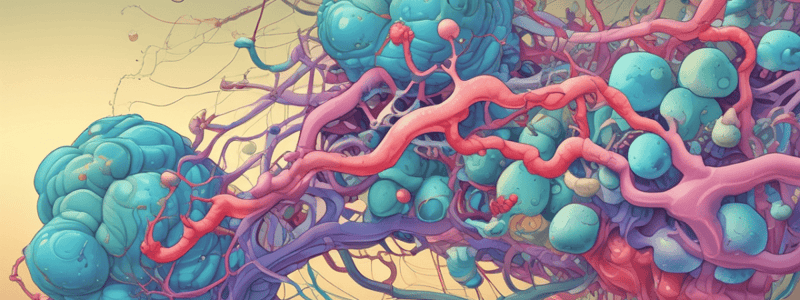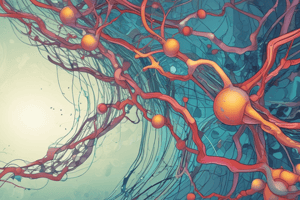Podcast
Questions and Answers
What is the primary function of channel proteins in the cell membrane?
What is the primary function of channel proteins in the cell membrane?
- To regulate hydrostatic pressure in the cell
- To shuttle molecules individually across the membrane
- To change shape and bind to specific molecules
- To create a direct pathway for specific molecules to pass through (correct)
What is the characteristic of transport through channel proteins?
What is the characteristic of transport through channel proteins?
- It is non-selective and involves diffusion
- It is slow and involves binding to molecules
- It is fast and involves a direct pathway (correct)
- It is selective and involves shape changes
What is the mechanism of transport of carrier proteins?
What is the mechanism of transport of carrier proteins?
- Creating a direct pathway for molecules to pass through
- Facilitating fluid distribution across the membrane
- Binding to specific molecules and changing shape (correct)
- Regulating osmotic pressure in the cell
What is the characteristic of carrier proteins during transport?
What is the characteristic of carrier proteins during transport?
Which type of transport protein is highly selective and often specific to certain molecules?
Which type of transport protein is highly selective and often specific to certain molecules?
What is the difference between channel proteins and carrier proteins in terms of transport speed?
What is the difference between channel proteins and carrier proteins in terms of transport speed?
What is the process by which solutes move from an area of low concentration to an area of high concentration, requiring energy and ATP?
What is the process by which solutes move from an area of low concentration to an area of high concentration, requiring energy and ATP?
What is the term that describes the balance of water movement between the inside and outside of a cell, resulting in no net movement of water?
What is the term that describes the balance of water movement between the inside and outside of a cell, resulting in no net movement of water?
What is the term that describes the number of particles in a solution, with higher osmolarity indicating a more 'crowded' solution?
What is the term that describes the number of particles in a solution, with higher osmolarity indicating a more 'crowded' solution?
What type of transport involves the movement of molecules from an area of high concentration to an area of low concentration, without the use of energy?
What type of transport involves the movement of molecules from an area of high concentration to an area of low concentration, without the use of energy?
What is the term that describes the movement of water into or out of a cell, resulting in changes in cell shape and size?
What is the term that describes the movement of water into or out of a cell, resulting in changes in cell shape and size?
What is the name of the pump that uses active transport to move sodium and potassium ions across the cell membrane?
What is the name of the pump that uses active transport to move sodium and potassium ions across the cell membrane?
What is the primary function of facilitated diffusion in biological systems?
What is the primary function of facilitated diffusion in biological systems?
What is the term for the continual exchange of water and solutes among body fluid compartments through processes such as filtration, reabsorption, diffusion, and osmosis?
What is the term for the continual exchange of water and solutes among body fluid compartments through processes such as filtration, reabsorption, diffusion, and osmosis?
What is the approximate percentage of total body water in a 70kg adult male?
What is the approximate percentage of total body water in a 70kg adult male?
What is the term for the movement of molecules from an area of higher concentration to an area of lower concentration without the use of energy?
What is the term for the movement of molecules from an area of higher concentration to an area of lower concentration without the use of energy?
What is the term for the movement of water molecules from an area of higher concentration to an area of lower concentration through a selectively permeable membrane?
What is the term for the movement of water molecules from an area of higher concentration to an area of lower concentration through a selectively permeable membrane?
What is the term for the movement of molecules across the cell membrane that requires the use of energy?
What is the term for the movement of molecules across the cell membrane that requires the use of energy?




